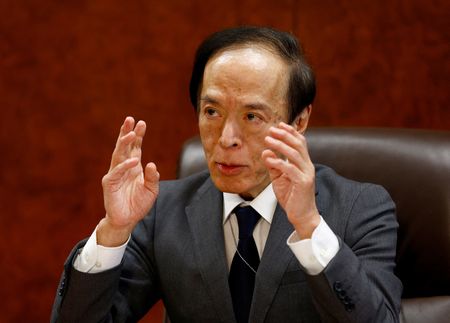 1
1 1
1
By Leika Kihara
TOKYO (Reuters) – Bank of Japan Governor Kazuo Ueda said on Friday the central bank did not have a set time frame for achieving its 2% inflation target but that it would strive to hit it at the earliest date possible.
Speaking in parliament, Ueda said the country’s trend inflation was likely to heighten ahead, but that achieving the BOJ’s target would take time.
He also said setting an explicit time frame for hitting the inflation goal was undesirable as doing so could have an unexpected impact on financial markets.
“The time it takes for the impact of monetary policy to appear on the economy could move around a lot depending on circumstances. We therefore do not have anytime time frame in mind” in achieving the inflation target, he said.
“Having said that, our baseline view is that it won’t take so long as over 10 years. We’ll still seek to hit the target at the earliest date possible,” Ueda said.
Ueda also said it was premature for the BOJ to discuss details of an exit strategy from its ultra-easy policy, including whether and when the central bank could begin selling its holdings of real-estate trust funds (REITs).
“We are conducting the purchases (of REITs) as part of our massive monetary easing programme. Given it will take more time to achieve our price target, we will maintain the easy policy,” he said, when asked by an opposition lawmaker on the likelihood of selling the BOJ’s holdings.
With inflation exceeding its 2% target for a year, market speculation is rife that Ueda will gradually phase out his predecessor’s stimulus that has drawn public criticism for distorting markets and crushing bank margins.
But the BOJ has kept interest rates super-low on the view that the recent rise in inflation is driven mostly by cost-push factors, not strong domestic demand, and therefore will prove temporary.
Ueda’s predecessor, Haruhiko Kuroda, deployed in 2013 a huge asset-buying programme with a pledge to achieve the BOJ’s 2% inflation target in roughly two years.
The BOJ’s target remained elusive until last year, when supply constraints and a spike in commodity costs caused by the COVID-19 pandemic and the war in Ukraine drove up Japan’s core consumer inflation near 4%.
(Reporting by Leika Kihara; Editing by Chang-Ran Kim, Shri Navaratnam and Kim Coghill)